When you visualize the iconic images of China what do you think of? In the top 4 have to be Mao Zedong, The Forbidden City, The Great Wall and finally Guilin with its fantastic karst mountain topography. There is a common saying in Chinese : 桂林山水甲天下 : Gulin’s scenery is the most beautiful under heaven. We set out for ourselves to find out.
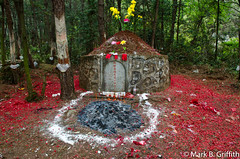 April brings Qing Ming Jie or Tomb Cleaning Festival when Chinese clean their ancestors graves and preform traditional gestures of veneration like burning money to ensure and firecrackers. The kids had a week off of school and so we headed out for our first local vacation in China. Originally I had debated over Yunan or Gulin, in the end we decided to head for Gulin for warmer temperatures and lower elevation.
April brings Qing Ming Jie or Tomb Cleaning Festival when Chinese clean their ancestors graves and preform traditional gestures of veneration like burning money to ensure and firecrackers. The kids had a week off of school and so we headed out for our first local vacation in China. Originally I had debated over Yunan or Gulin, in the end we decided to head for Gulin for warmer temperatures and lower elevation.
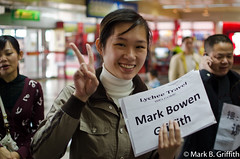 Our departure was not without its own difficulties but we finally managed to arrive in Guilin after our three hour flight from Beijing. The warmer temperatures and the humidity immediately reminded us of our time when we lived in Taiwan, almost 15 years ago. The Guilin airport is west of town and the travel agency arranged for a van to transport the four of us and our backpacks into town to our hotel. The ride in takes around an hour and winds its way through the karst scenery that the area is known for. Limestone has eroded leaving small “mountains” that dot the landscape and are heavily covered in vegetation. The geography is surreal and stunning and is emblazoned on every 20 rmb note.
Our departure was not without its own difficulties but we finally managed to arrive in Guilin after our three hour flight from Beijing. The warmer temperatures and the humidity immediately reminded us of our time when we lived in Taiwan, almost 15 years ago. The Guilin airport is west of town and the travel agency arranged for a van to transport the four of us and our backpacks into town to our hotel. The ride in takes around an hour and winds its way through the karst scenery that the area is known for. Limestone has eroded leaving small “mountains” that dot the landscape and are heavily covered in vegetation. The geography is surreal and stunning and is emblazoned on every 20 rmb note.
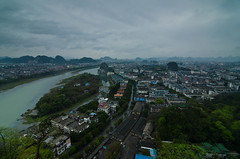 Our plan was Guilin for 3 nights, Yangshuo for 3 nights and one night at LongShen, the terraced rice fields. I was so busy with work I didn’t have a lot of time to research the “perfect place” and so I opted for an online travel agent to do the booking and the 5-star hotel option. One thing though I had spent a bit of time researching was trying to find someone local to the Guilin area to help orient us and point us in the right direction. Through ctrip I came across a blog written by a Bradford Fried who waxed poetic about the natural beauty of the area. I googled him, found an email address and dropped him a note. He emailed me back a week later and he said he knew a local, whose English name was Kolok, who would be perfect to show us the local sights. I was mostly interested in finding places for dawn patrol and sunrise photos early early in the morning while the kids and Stac woke up.
Our plan was Guilin for 3 nights, Yangshuo for 3 nights and one night at LongShen, the terraced rice fields. I was so busy with work I didn’t have a lot of time to research the “perfect place” and so I opted for an online travel agent to do the booking and the 5-star hotel option. One thing though I had spent a bit of time researching was trying to find someone local to the Guilin area to help orient us and point us in the right direction. Through ctrip I came across a blog written by a Bradford Fried who waxed poetic about the natural beauty of the area. I googled him, found an email address and dropped him a note. He emailed me back a week later and he said he knew a local, whose English name was Kolok, who would be perfect to show us the local sights. I was mostly interested in finding places for dawn patrol and sunrise photos early early in the morning while the kids and Stac woke up.
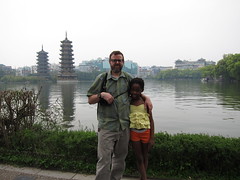 On our way to the hotel we passed by two pagoda’s that were built beside a lake. We asked the travel agent how old they were, she said 5. We of course assumed there was a miscommunication and that she had meant 500 years. We checked into our hotel and wandered across the street that was framed in a green canopy of osmanthus trees. The Chinese name for osmanthus is Gui and Lin means forest. We walked beside the river in the warm afternoon air. We were approached several times for boat tours on the Li River, but we held off. We purchased some sugar cane, which Sofi loves to chaw on, some fresh corn on the cob and some lychees. We immediately noticed that despite this being a tourist destination, we were stared at much more than we ever were in Beijing. We get more than our fair shares of stares anyway because our family is mixed. Sofi and Miles draw a lot of attention. People love to come up and touch their hair, or snap a photo slyly with their camera phone or sometimes they’ll even ask to have their photo taken with them. Miles and Sofi thankfully are good sports about it and don’t seem to mind at all.
On our way to the hotel we passed by two pagoda’s that were built beside a lake. We asked the travel agent how old they were, she said 5. We of course assumed there was a miscommunication and that she had meant 500 years. We checked into our hotel and wandered across the street that was framed in a green canopy of osmanthus trees. The Chinese name for osmanthus is Gui and Lin means forest. We walked beside the river in the warm afternoon air. We were approached several times for boat tours on the Li River, but we held off. We purchased some sugar cane, which Sofi loves to chaw on, some fresh corn on the cob and some lychees. We immediately noticed that despite this being a tourist destination, we were stared at much more than we ever were in Beijing. We get more than our fair shares of stares anyway because our family is mixed. Sofi and Miles draw a lot of attention. People love to come up and touch their hair, or snap a photo slyly with their camera phone or sometimes they’ll even ask to have their photo taken with them. Miles and Sofi thankfully are good sports about it and don’t seem to mind at all.
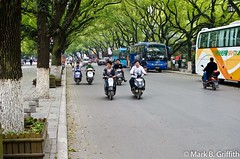 At 5pm we met Bradford and Kolok in the lobby. Kolok arrived first and he had long hair down past his shoulder and a braided band on his forehead. Not your typical Chinese look. While traveling with him I noticed he got almost as many stares from local folks as did Sofi and Miles and myself. Bradford was there to introduce us to Kolok and tell us a bit about Guilin. We accompanied them down the street to a rooftop tea shop where we overlooked the Li River and Elephant Hill. Bradford has lived in Guilin for the past 8 years and told us how much Guilin has transformed itself over the past several years. The pagoda’s we saw were in fact 5 years old not five hundred. The lake beside them : man-made around the same time. Later as we walked to dinner we passed by copies of the Golden Gate Bridge across one river, the Arc de Triumph in a park and the Louvre Pyramid in a plaza. Why try something new when you can re-use time-tested icons that are loved the world over. That evening as we went home it was dark and Guilin had neon lighting up the streets, the trees and bridges along the river. Despite all the nature given how popular Guilin is there is a lot of odd tourist aspects to the town.
At 5pm we met Bradford and Kolok in the lobby. Kolok arrived first and he had long hair down past his shoulder and a braided band on his forehead. Not your typical Chinese look. While traveling with him I noticed he got almost as many stares from local folks as did Sofi and Miles and myself. Bradford was there to introduce us to Kolok and tell us a bit about Guilin. We accompanied them down the street to a rooftop tea shop where we overlooked the Li River and Elephant Hill. Bradford has lived in Guilin for the past 8 years and told us how much Guilin has transformed itself over the past several years. The pagoda’s we saw were in fact 5 years old not five hundred. The lake beside them : man-made around the same time. Later as we walked to dinner we passed by copies of the Golden Gate Bridge across one river, the Arc de Triumph in a park and the Louvre Pyramid in a plaza. Why try something new when you can re-use time-tested icons that are loved the world over. That evening as we went home it was dark and Guilin had neon lighting up the streets, the trees and bridges along the river. Despite all the nature given how popular Guilin is there is a lot of odd tourist aspects to the town.
However no matter how gaudy or “built up” Guilin is, its much smaller than other Chinese “big cities”, like Shanghai or Beijing. Things move slower, they seem a bit more languid, and the tourism isn’t in your face. There are of course the list of things you have to do while in Guilin, the tourism websites will spell those out. This is the same of most places you visit. If you go to Seattle you have to visit the Space Needle and Pikes Market. If you go to Paris you have to see the Louvre and the Eiffel Tower. The reasons are multi-faceted : many of these things are really amazing, but their promotion and attraction often create crowds and commercialize them. I try to dabble in these “must do’s” sparingly and attempt to find ways to see or experience them without the crowds; sometimes the people are unavoidable but often you can find a quieter way to visit the must sees. For example I’ve visited the Great Wall five times, but never the section where most tour companies go and I rarely see many people. It’s one reason for Dawn Patrol, people typically aren’t up early. It’s also very important to me sample the amazing that aren’t on the must see list; these might be called the local places. The secret favorites of the natives that have less visitors but are just as amazing.
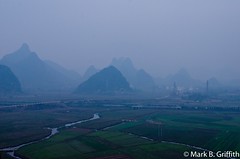 Kolok, our local guide was my answer for this in Guilin and Yangshuo. When finding a guide I think its important to find someone with similar tastes. If you are a 65 year old retired German couple (not that there is anything wrong with that) Kolok is probably not your guy. He’s easy going; he loves the outdoors; he loves to hike and camp and bike around the countryside. Things I also enjoy. My first morning on Saturday we rented bikes (15 rmb a day) and left the hotel at 5am. In 10 minutes we were outside the city limits and biking in the country side. We were headed for Chao Yang Dong : The Cave that faces the Rising Sun. This is small karst mountain in the countryside. Midway up the mountain side there is a cave that pierces the mountain from east to west; a small trail leads to the caves entrance. The story goes that originally this was a Daoist temple, you can see some evidence of a gate on either end of the cave and cooking area inside the cave. We climbed up the trail in the dark and sat on the east side waiting for the sun to rise. Pitch black we could see the scooters and farm trucks coming down the road every so often. Gradually the sky began to lighten and dawn came. No sunrise to speak of but the misty views slowly revealed layers of karts in the landscape beyond as we watched people wander out into fields among the irrigation rivers to weed and plant.
Kolok, our local guide was my answer for this in Guilin and Yangshuo. When finding a guide I think its important to find someone with similar tastes. If you are a 65 year old retired German couple (not that there is anything wrong with that) Kolok is probably not your guy. He’s easy going; he loves the outdoors; he loves to hike and camp and bike around the countryside. Things I also enjoy. My first morning on Saturday we rented bikes (15 rmb a day) and left the hotel at 5am. In 10 minutes we were outside the city limits and biking in the country side. We were headed for Chao Yang Dong : The Cave that faces the Rising Sun. This is small karst mountain in the countryside. Midway up the mountain side there is a cave that pierces the mountain from east to west; a small trail leads to the caves entrance. The story goes that originally this was a Daoist temple, you can see some evidence of a gate on either end of the cave and cooking area inside the cave. We climbed up the trail in the dark and sat on the east side waiting for the sun to rise. Pitch black we could see the scooters and farm trucks coming down the road every so often. Gradually the sky began to lighten and dawn came. No sunrise to speak of but the misty views slowly revealed layers of karts in the landscape beyond as we watched people wander out into fields among the irrigation rivers to weed and plant.
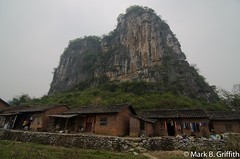 As we descended I thought perhaps we could walk out into the field to the small river for some photos. What was a beautiful scene from above, below became a dull field with power lines across the horizon on the ground. We walked back to our bikes passing a small row of homes that migrant workers rented from the landlord. They tended to the fields as a way to augment their meager incomes with fresh vegetables for food. Kolok said they probably were farmers from a countryside far away that performed menial jobs in Guilin like cleaning bus terminals, or sweeping the streets of the evergreen osmanthus leaves that fell every day along the avenues.
As we descended I thought perhaps we could walk out into the field to the small river for some photos. What was a beautiful scene from above, below became a dull field with power lines across the horizon on the ground. We walked back to our bikes passing a small row of homes that migrant workers rented from the landlord. They tended to the fields as a way to augment their meager incomes with fresh vegetables for food. Kolok said they probably were farmers from a countryside far away that performed menial jobs in Guilin like cleaning bus terminals, or sweeping the streets of the evergreen osmanthus leaves that fell every day along the avenues.
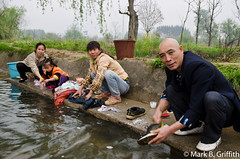 We pedaled through the countryside among the small village settlements. We passed several locations where people were washing their clothes by hand in the streams. Chatting happily as they scrubbed their clothes. They would later hand them outside their homes to dry. Our modern conveniences that we “must have” are not even a consideration; their income is insufficient for such luxuries where time and labor will suffice. This also applies to the method of farming. Fields are cleared by hand with scythes and shovels. Ground is broken with a plow and water buffalo as power. There are no large tractors with plows, human capital powers most everything in China. We passed one group of farmers working in the field, I thought they were farming but found them instead building a ditch and flattening out ground for a access road to the fields. The government had supplied money for the project. Gravel was supplied by the two stroke carts that farmers do use to haul everything around.
We pedaled through the countryside among the small village settlements. We passed several locations where people were washing their clothes by hand in the streams. Chatting happily as they scrubbed their clothes. They would later hand them outside their homes to dry. Our modern conveniences that we “must have” are not even a consideration; their income is insufficient for such luxuries where time and labor will suffice. This also applies to the method of farming. Fields are cleared by hand with scythes and shovels. Ground is broken with a plow and water buffalo as power. There are no large tractors with plows, human capital powers most everything in China. We passed one group of farmers working in the field, I thought they were farming but found them instead building a ditch and flattening out ground for a access road to the fields. The government had supplied money for the project. Gravel was supplied by the two stroke carts that farmers do use to haul everything around.
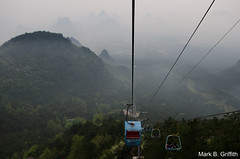 That afternoon the kids and myself took bus #24 east out of Guilin to Yao Shan (Yao Mountain). A taxi would have only cost around 25-30 rmb (4-5 dollars US) but a bus ride would cost us 6 rmb, around $.90. I’ve become much more sensitive to price over here, its easy to think only in US dollar but I’ve tried to switch gears mostly in an effort to not be so callous to local sense of cost. I feel its rude to at times be so cavalier about spending what are large sums in local currency around the local people I interact with. Yao Shan is a large mountain that has commanding views over the city, the Li River and unending ridges of karats that surround. There is a tram we rode to the top, as we did we saw college kids who didn’t want to pay the fee and were hiking up. Halfway up there is an alpine slide that we planned to ride back down. The higher we got the more the mist blew in and at the top a slight rain began to blow. We wandered among the clouds, the rain and the spring blossoms. As we rode down the tram we were informed that the alpine slide was closed due to rain. Horrific crying and whining ensued from the kids who were sorely disappointed and blamed me for going all the way to the top and taking too many photos. It wasn’t raining when we passed the slide half way up, but it was my fault for the rain by the time we got down. We’d walked up the road from the bus stop and they were non too interested in walking back. We caught a motor-cycle taxi (a motor cycle front, with a large flat covered platform with bench seats in the back) back down to where we were able to catch a taxi back into Guilin city.
That afternoon the kids and myself took bus #24 east out of Guilin to Yao Shan (Yao Mountain). A taxi would have only cost around 25-30 rmb (4-5 dollars US) but a bus ride would cost us 6 rmb, around $.90. I’ve become much more sensitive to price over here, its easy to think only in US dollar but I’ve tried to switch gears mostly in an effort to not be so callous to local sense of cost. I feel its rude to at times be so cavalier about spending what are large sums in local currency around the local people I interact with. Yao Shan is a large mountain that has commanding views over the city, the Li River and unending ridges of karats that surround. There is a tram we rode to the top, as we did we saw college kids who didn’t want to pay the fee and were hiking up. Halfway up there is an alpine slide that we planned to ride back down. The higher we got the more the mist blew in and at the top a slight rain began to blow. We wandered among the clouds, the rain and the spring blossoms. As we rode down the tram we were informed that the alpine slide was closed due to rain. Horrific crying and whining ensued from the kids who were sorely disappointed and blamed me for going all the way to the top and taking too many photos. It wasn’t raining when we passed the slide half way up, but it was my fault for the rain by the time we got down. We’d walked up the road from the bus stop and they were non too interested in walking back. We caught a motor-cycle taxi (a motor cycle front, with a large flat covered platform with bench seats in the back) back down to where we were able to catch a taxi back into Guilin city.
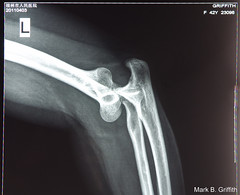 The next day the kids and myself went with Kolok to the most famous park in Guilin : Seven Star Park . This park is “huge” and has a fee to enter. Inside there are many many acres of park with activities. You could spend an entire day just exploring this park. We headed up one of the peaks searching for the groups of wild monkeys that had escaped from a local zoo years ago and now prospered on their own. After an hour of exploration we never found them; I got a call from Stac who was sobbing in pain. She’d fallen in the hotel and was sure she’d broken in her arm. We hurried home and Kolok accompanied us to the Gulin People’s Hospital. We went to the emergency room where we admitted her and we started the X-ray process.
The next day the kids and myself went with Kolok to the most famous park in Guilin : Seven Star Park . This park is “huge” and has a fee to enter. Inside there are many many acres of park with activities. You could spend an entire day just exploring this park. We headed up one of the peaks searching for the groups of wild monkeys that had escaped from a local zoo years ago and now prospered on their own. After an hour of exploration we never found them; I got a call from Stac who was sobbing in pain. She’d fallen in the hotel and was sure she’d broken in her arm. We hurried home and Kolok accompanied us to the Gulin People’s Hospital. We went to the emergency room where we admitted her and we started the X-ray process.
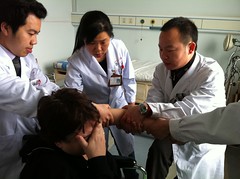 The ER doctor was for sure that she’d broken it. Up the hallway in an wheel chair to the elevator, down a floor to the X-ray room. Excruciating pain as they moved her arm into position and took 4 x-rays. Back up the elevator and down the hallway to the ER doc : dislocated. Then back down to see the arm doctor who confirmed the dislocation. He and a group of 3 other students grabbed her arm and “yanked” it back into place. Stac had tears of pain streaming down her face. Typically in the US they give you anesthesia before resetting a dislocation, but not in China. Then back up two floors to the the x-ray room for more x-rays to ensure that things looked ok. Then back down to wait with the ER doc and then more waiting while they consulted the arm doctor. Throughout this Stac was in great pain. We had asked the ER doc, with Kolok translating, several times for pain medication and he just brushed us off. He said they had a topical spray that they would give us, which was so good it had been exported to America. We pushed him again for pain meds and in the end he prescribed 5 pills of a very weak pain killer. We went down to pay our bill and that’s an involved process of a clerk taking all of the hand written notes for each procedure and prescription and entering into the computer. Finally we paid, the entire cost was 863 rmb ($132 US), and this was before insurance (who knows how long it will take to figure out how to bill Aetna Global); if your lucky this is what your deductible would be in the US after the 1000 dollars the ER charged you. Kolok noted that this was very expensive to him and if he’d had such a condition he’d have just had two friends pull his arm back into place.
The ER doctor was for sure that she’d broken it. Up the hallway in an wheel chair to the elevator, down a floor to the X-ray room. Excruciating pain as they moved her arm into position and took 4 x-rays. Back up the elevator and down the hallway to the ER doc : dislocated. Then back down to see the arm doctor who confirmed the dislocation. He and a group of 3 other students grabbed her arm and “yanked” it back into place. Stac had tears of pain streaming down her face. Typically in the US they give you anesthesia before resetting a dislocation, but not in China. Then back up two floors to the the x-ray room for more x-rays to ensure that things looked ok. Then back down to wait with the ER doc and then more waiting while they consulted the arm doctor. Throughout this Stac was in great pain. We had asked the ER doc, with Kolok translating, several times for pain medication and he just brushed us off. He said they had a topical spray that they would give us, which was so good it had been exported to America. We pushed him again for pain meds and in the end he prescribed 5 pills of a very weak pain killer. We went down to pay our bill and that’s an involved process of a clerk taking all of the hand written notes for each procedure and prescription and entering into the computer. Finally we paid, the entire cost was 863 rmb ($132 US), and this was before insurance (who knows how long it will take to figure out how to bill Aetna Global); if your lucky this is what your deductible would be in the US after the 1000 dollars the ER charged you. Kolok noted that this was very expensive to him and if he’d had such a condition he’d have just had two friends pull his arm back into place.
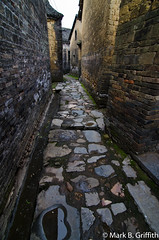 That afternoon while Stac rested in the hotel room with Miles and Sofi and I and Kolok rented a couple of scooters and went for a ride north of Guilin to visit the village of JiangTou. The ride was about an hour north on country roads. The weather had changed, we arrived in shorts but a cold front had blown in from the north and things had gotten down right chilly. My hands and feet were freezing. We ended up stopping long the way at a grocery store and buying gloves and extra socks for Sofi and I. Finally we arrived at JiangTou, a village with a 1000 years of history. We walked the narrow lanes between yellow brick houses. The walkways had been embedded with river stones and each doorway had a intricate and unique pattern of stones. I was amazed that many of the doorway’s had decal’s of , they had faded with age and were more than likely left over from the Cultural Revolution (1966-1976). Outside each doorway or just inside the courtyard was a pump connected to the well water. Electric wires were strung to each home and most probably had no running water but had a TV. It was amazing to see the ancient way preserved among fields still farmed by people who could trace their lineage 12 generations.
That afternoon while Stac rested in the hotel room with Miles and Sofi and I and Kolok rented a couple of scooters and went for a ride north of Guilin to visit the village of JiangTou. The ride was about an hour north on country roads. The weather had changed, we arrived in shorts but a cold front had blown in from the north and things had gotten down right chilly. My hands and feet were freezing. We ended up stopping long the way at a grocery store and buying gloves and extra socks for Sofi and I. Finally we arrived at JiangTou, a village with a 1000 years of history. We walked the narrow lanes between yellow brick houses. The walkways had been embedded with river stones and each doorway had a intricate and unique pattern of stones. I was amazed that many of the doorway’s had decal’s of , they had faded with age and were more than likely left over from the Cultural Revolution (1966-1976). Outside each doorway or just inside the courtyard was a pump connected to the well water. Electric wires were strung to each home and most probably had no running water but had a TV. It was amazing to see the ancient way preserved among fields still farmed by people who could trace their lineage 12 generations.
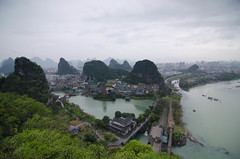 On our last day from Guilin Kolok and I left the hotel at 5 am as we got on the scooter the rain began falling. We headed to DieCai Shan, another small mountain karst that overlooks the city; didn’t look like there was going to be much of a sunrise. We climbed the steps in the rain and arrived at the summit where a small pagoda stood. There was no refuge from the rain as the wind blew in sideways. There was at least 40 minutes until the “sunrise” and it was miserable. I was ready to go home, but rather than give up we descended to a much larger platform on the mountain’s side and waited dry until things began to lighten. We walked up the last hundred feet ago as the sky cleared and the rain stopped. There was no sunrise to speak of but the air was exceptionally clear as a strong wind had blown out the clouds. I got a few great photos of the city in grey and we descended. Time to start packing up and get ready for our departure to Yangshuo.
On our last day from Guilin Kolok and I left the hotel at 5 am as we got on the scooter the rain began falling. We headed to DieCai Shan, another small mountain karst that overlooks the city; didn’t look like there was going to be much of a sunrise. We climbed the steps in the rain and arrived at the summit where a small pagoda stood. There was no refuge from the rain as the wind blew in sideways. There was at least 40 minutes until the “sunrise” and it was miserable. I was ready to go home, but rather than give up we descended to a much larger platform on the mountain’s side and waited dry until things began to lighten. We walked up the last hundred feet ago as the sky cleared and the rain stopped. There was no sunrise to speak of but the air was exceptionally clear as a strong wind had blown out the clouds. I got a few great photos of the city in grey and we descended. Time to start packing up and get ready for our departure to Yangshuo.
Yangshuo
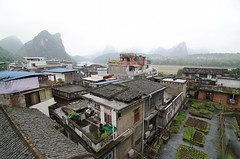 The bus station in Guliin is crowded and a bus leaves every 15 minutes for Yangshuo, a journey of 65 km. Unfortunately since we were traveling during QingMingJie things were very crowded and we wouldn’t be able to leave for 2 hours. So Kolok went in search of a taxi, he was able to locate a small van which took us for around $30 US. We arrived in the rain and got settled into our hotel. Kolok wasn’t planning on spending the evening in Yangshuo but was going to show us around. Sofi and I decided to accompany him on a boat ride on the Li River to fishing village called Jianguo which was around an hour’s ride away. There are many different kinds of boats on the Li. There are large boats with multi-decks that have kitchens on the back that will take you touring and can even be ridden on a four hour cruise from Guilin to Yangshuo. The most common is a “bamboo raft” boat which is between 2-3 meters wide and 5-6 meters long; traditionally these were made from large bamboo but now a-days are built from white pvc pipe (they last longer). The ends of the raft are curved up on either end and the middle is covered by a small pavilion with three or four bench seats that can seat two adults comfortably. The captain sits on the back of the boat wielding a long lever attached to a longer motor shaft with a small propeller on the end, the kind you see in movies on the boats in Thailand (remember the James Bond movie : The Man with the Golden Gun). The boats ride very close to the water and yet they are very stable.
The bus station in Guliin is crowded and a bus leaves every 15 minutes for Yangshuo, a journey of 65 km. Unfortunately since we were traveling during QingMingJie things were very crowded and we wouldn’t be able to leave for 2 hours. So Kolok went in search of a taxi, he was able to locate a small van which took us for around $30 US. We arrived in the rain and got settled into our hotel. Kolok wasn’t planning on spending the evening in Yangshuo but was going to show us around. Sofi and I decided to accompany him on a boat ride on the Li River to fishing village called Jianguo which was around an hour’s ride away. There are many different kinds of boats on the Li. There are large boats with multi-decks that have kitchens on the back that will take you touring and can even be ridden on a four hour cruise from Guilin to Yangshuo. The most common is a “bamboo raft” boat which is between 2-3 meters wide and 5-6 meters long; traditionally these were made from large bamboo but now a-days are built from white pvc pipe (they last longer). The ends of the raft are curved up on either end and the middle is covered by a small pavilion with three or four bench seats that can seat two adults comfortably. The captain sits on the back of the boat wielding a long lever attached to a longer motor shaft with a small propeller on the end, the kind you see in movies on the boats in Thailand (remember the James Bond movie : The Man with the Golden Gun). The boats ride very close to the water and yet they are very stable.
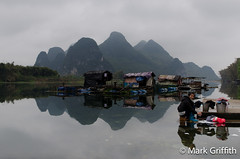 Our captain was a woman that Kolok knew from his many trips to the area. Her family had only recently in the past two years left living on a house boat for living on a house on land. We weaved in and out of other rafts and before to long we were the only boat on the river as we headed for the fishing village. The weather was still cold and Sofi and I bundled up in a thick old army coat to ward off the cold that with the humidity cut like a knife. As we arrived at LiuGong there was a woman washing her clothes in the river, she helped pull the raft on land and Sofi, Kolok and myself hopped off. A water buffalo eyed us curiously as it chewed on grass on a small hill above us. We took a short hike that climbed up the side of the cliff onto a bluff that overlooked the river, there were nice views of the field on the otherside of the river that were lined with bamboo. We could see farmers and water buffalo grazing across the way. We walked through some fields to the back of the village and back down the boat where we road back into Yangshuo. Kolok gave us several more ideas for places we could visit and then departed and headed back home to Guilin.
Our captain was a woman that Kolok knew from his many trips to the area. Her family had only recently in the past two years left living on a house boat for living on a house on land. We weaved in and out of other rafts and before to long we were the only boat on the river as we headed for the fishing village. The weather was still cold and Sofi and I bundled up in a thick old army coat to ward off the cold that with the humidity cut like a knife. As we arrived at LiuGong there was a woman washing her clothes in the river, she helped pull the raft on land and Sofi, Kolok and myself hopped off. A water buffalo eyed us curiously as it chewed on grass on a small hill above us. We took a short hike that climbed up the side of the cliff onto a bluff that overlooked the river, there were nice views of the field on the otherside of the river that were lined with bamboo. We could see farmers and water buffalo grazing across the way. We walked through some fields to the back of the village and back down the boat where we road back into Yangshuo. Kolok gave us several more ideas for places we could visit and then departed and headed back home to Guilin.
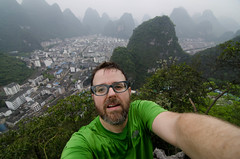 The next morning I tried for one last Dawn Patrol, still hoping to catch a sunrise. I left the hotel at 5:30 am. Immediately a guy on a motorcycle drove up and asked if I wanted a ride. I asked home much and he said 5 rmb (.90 cents) and he dropped me off at Bilianfeng Park. I’d checked the day before they didn’t open until 8, the entrance way was covered with an 8 foot piece of heavy fabric that was pulled taut and padlocked on either end. But I was able to pull up the fabric and the bottom, push my pack in and slide under. As I did so, a guy wiping sleep from his eyes wandered out of the entrance building and started yelling at me that I was permitted to enter. I told him I was willing to pay the entrance fee, but he refused; unlocked the “gate” and made me leave. So I started walking to Yangshuo Park. I hadn’t seen the layout previously and I wandered around looking for a way to get up on top of something. By the time I found the steps leading up the sunrise had already begun, but no worries since there was really no sun to speak off. The steps ended after a hundred feet, 300-400 feet of karst remained until the top. There was a faint “trail” leading up so I scrambled up the vegetation and limestone, until eventually I arrived at the top. Fantastic views of Yangshuo lay below me. No sunrise, but elevation gained and beauty found.
The next morning I tried for one last Dawn Patrol, still hoping to catch a sunrise. I left the hotel at 5:30 am. Immediately a guy on a motorcycle drove up and asked if I wanted a ride. I asked home much and he said 5 rmb (.90 cents) and he dropped me off at Bilianfeng Park. I’d checked the day before they didn’t open until 8, the entrance way was covered with an 8 foot piece of heavy fabric that was pulled taut and padlocked on either end. But I was able to pull up the fabric and the bottom, push my pack in and slide under. As I did so, a guy wiping sleep from his eyes wandered out of the entrance building and started yelling at me that I was permitted to enter. I told him I was willing to pay the entrance fee, but he refused; unlocked the “gate” and made me leave. So I started walking to Yangshuo Park. I hadn’t seen the layout previously and I wandered around looking for a way to get up on top of something. By the time I found the steps leading up the sunrise had already begun, but no worries since there was really no sun to speak off. The steps ended after a hundred feet, 300-400 feet of karst remained until the top. There was a faint “trail” leading up so I scrambled up the vegetation and limestone, until eventually I arrived at the top. Fantastic views of Yangshuo lay below me. No sunrise, but elevation gained and beauty found.
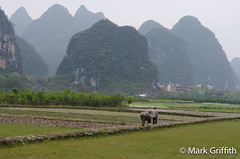 Later that morning Stac’s arm was still in considerable pain and so the kids and I planned an excursion. We wandered down to West Street where the tourism is thick, fast and furious. Yangshuo is much smaller than Guilin. Its nestled in a small valley surrounded by karst mountains on three sides and the Li River on the other. It’s unabashed about the fact that its a tourist destination, there are shops, restaurants and bars all aimed at attracting your tourist rmb. And there are way more Chinese tourists than westerners, though you see a lot of westerners. And there is a lot of western food available as well. We ate wood fired pizza, burgers, schwarma, falafel and hummus. We approached a vendor who rented scooters. I asked for a big one. She asked for a 500 rmb deposit and collected the 120 rmb rental fee up front. She showed me the gas was full and instructed me to bring it back full and she gave me my helmet. No contract, no paper work, no waiver just cold hard cash. I asked for two extra helmets, one for Sofi and one for Miles : no problem, no questions. Miles sat in front of me, and Sofi sat behind me and off we went. This was no different than what hundreds of other Chinese families do. Stac and I even saw a family of 5 riding a single scooter in Taiwan.
Later that morning Stac’s arm was still in considerable pain and so the kids and I planned an excursion. We wandered down to West Street where the tourism is thick, fast and furious. Yangshuo is much smaller than Guilin. Its nestled in a small valley surrounded by karst mountains on three sides and the Li River on the other. It’s unabashed about the fact that its a tourist destination, there are shops, restaurants and bars all aimed at attracting your tourist rmb. And there are way more Chinese tourists than westerners, though you see a lot of westerners. And there is a lot of western food available as well. We ate wood fired pizza, burgers, schwarma, falafel and hummus. We approached a vendor who rented scooters. I asked for a big one. She asked for a 500 rmb deposit and collected the 120 rmb rental fee up front. She showed me the gas was full and instructed me to bring it back full and she gave me my helmet. No contract, no paper work, no waiver just cold hard cash. I asked for two extra helmets, one for Sofi and one for Miles : no problem, no questions. Miles sat in front of me, and Sofi sat behind me and off we went. This was no different than what hundreds of other Chinese families do. Stac and I even saw a family of 5 riding a single scooter in Taiwan.
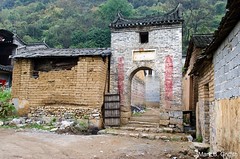 We headed south out of Yangshuo on a small paved single lane country road heading for the village of JiuXian that Kolok had told us about. The back road there is fantastic, its a small valley that winds through karsts, it felt very akin to driving through a green version of Zions National Park in southern Utah. The road parallels the Yulong river and eventually the road ends at a launching point on the river where you can ride a bamboo raft. From here we took a very muddy “road” north east to the main dirt road that leads to Jiuxian. This road was extremely slippery from all the rain and several times I had to put down my feet to steady us. Finally on the “main road” we drove through the small country towns until we reached the village of JiuXian. Here houses 400 years old remain in the same condition as they have for generations. We stopped at a small restaurant and ordered a several dishes for lunch. Miles had his usual plate of fried rice, while Sofi and I chewed on some bony chicken and some eggplant.
We headed south out of Yangshuo on a small paved single lane country road heading for the village of JiuXian that Kolok had told us about. The back road there is fantastic, its a small valley that winds through karsts, it felt very akin to driving through a green version of Zions National Park in southern Utah. The road parallels the Yulong river and eventually the road ends at a launching point on the river where you can ride a bamboo raft. From here we took a very muddy “road” north east to the main dirt road that leads to Jiuxian. This road was extremely slippery from all the rain and several times I had to put down my feet to steady us. Finally on the “main road” we drove through the small country towns until we reached the village of JiuXian. Here houses 400 years old remain in the same condition as they have for generations. We stopped at a small restaurant and ordered a several dishes for lunch. Miles had his usual plate of fried rice, while Sofi and I chewed on some bony chicken and some eggplant.
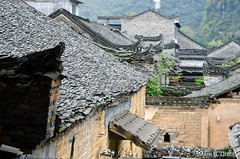 I stopped to chat with several old men sitting on the side of road. They were 74, 82, 71 and 83 years old. I told them their village was beautiful and they said not so, they were poor and no money. Sad to think what electricity and TV has done to make people’s expectations rise unnecessarily. We made our way back on the main road to Yangshuo and returned the scooter.
I stopped to chat with several old men sitting on the side of road. They were 74, 82, 71 and 83 years old. I told them their village was beautiful and they said not so, they were poor and no money. Sad to think what electricity and TV has done to make people’s expectations rise unnecessarily. We made our way back on the main road to Yangshuo and returned the scooter.
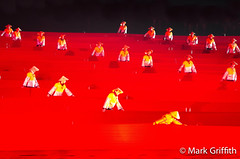 That evening the entire family, including Stac with her arm in pain went and saw Impressions Liu Sanjie Water Show in Yangshuo. The setting is the Li River in a small bay with limestone karsts surrounding it. The entire show is preformed on the water, with most of the participants using bamboo rafts to maneuver. The show was directed by Zhang YiMou, who did the opening and closing ceremonies at the Olympics and is full of light and color. Without understanding the language the story there are plenty of fantastic visuals. That evening Stac had finally had enough of the pain with no pain pills so we decided the next day (Wednesday) would be our last and we’d head home early to Beijing on Thursday where Stac could get some pain killers and get her arm checked out again.
That evening the entire family, including Stac with her arm in pain went and saw Impressions Liu Sanjie Water Show in Yangshuo. The setting is the Li River in a small bay with limestone karsts surrounding it. The entire show is preformed on the water, with most of the participants using bamboo rafts to maneuver. The show was directed by Zhang YiMou, who did the opening and closing ceremonies at the Olympics and is full of light and color. Without understanding the language the story there are plenty of fantastic visuals. That evening Stac had finally had enough of the pain with no pain pills so we decided the next day (Wednesday) would be our last and we’d head home early to Beijing on Thursday where Stac could get some pain killers and get her arm checked out again.
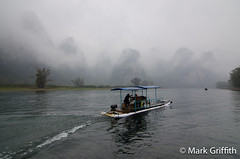 Wednesday morning the kids and went on one last excursion. Our destination was XingPing, a small town 40 minutes north east of Yangshuo by bus. We walked down to West Street where we were approached by a Chinese local Miki. She offered to guide us to XingPing, accompany us on the boat up to YuChen (Fish Villiage) and down to 9 Horse Mountain. She ended up being fantastic, she speaks good “guide English” (meaning she has really good basic English and has good understanding but choose simple words and phrases), all of which she has learned her self over the past ten years. She has a little black book that she carries around with English phrases and their Chinese translations as well as recommendations from past clients written in every language you can imagine : Chinese, Korean, Japanese, English, Spanish, French, German etc. Her husband is a rice farmer, he’s just left for Hunan to work in construction for a couple of months to earn extra money (a common practice in China). She lives at Moon Hill, south west of Yangshuo and rides her bike 40 minutes into Yangshuo each day. She is very friendly, honest and knowledgeable about the local area. I highly reccomend her if your in the Yangshuo area and you need a guide. A guide will really help you get to and see places easily, get bus tickets, order food, rent bikes or scooters, reserve boats etc. They are worth their weight in gold, especially one that is honest and genuine like Miki. Her mobile phone is 15878367912, give her a call if you visit the area.
Wednesday morning the kids and went on one last excursion. Our destination was XingPing, a small town 40 minutes north east of Yangshuo by bus. We walked down to West Street where we were approached by a Chinese local Miki. She offered to guide us to XingPing, accompany us on the boat up to YuChen (Fish Villiage) and down to 9 Horse Mountain. She ended up being fantastic, she speaks good “guide English” (meaning she has really good basic English and has good understanding but choose simple words and phrases), all of which she has learned her self over the past ten years. She has a little black book that she carries around with English phrases and their Chinese translations as well as recommendations from past clients written in every language you can imagine : Chinese, Korean, Japanese, English, Spanish, French, German etc. Her husband is a rice farmer, he’s just left for Hunan to work in construction for a couple of months to earn extra money (a common practice in China). She lives at Moon Hill, south west of Yangshuo and rides her bike 40 minutes into Yangshuo each day. She is very friendly, honest and knowledgeable about the local area. I highly reccomend her if your in the Yangshuo area and you need a guide. A guide will really help you get to and see places easily, get bus tickets, order food, rent bikes or scooters, reserve boats etc. They are worth their weight in gold, especially one that is honest and genuine like Miki. Her mobile phone is 15878367912, give her a call if you visit the area.
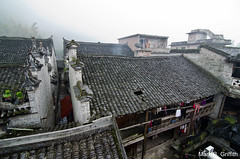 The bus ride to XingPing was 28 rmb for the four of us and was uneventful though it was very bumpy due to the condition of the road. Of course by this time uneventful meant we paid no attention to the driving, the honking, the passing on hills or turns, just normal country driving. The rain was falling in XingPing and we were glad we’d come prepared with our raincoats. The wind blew the mist on the raft onto us and we were pretty wet by the time we arrived at YuChen (Fish Village). I purchased three umbrellas for me and the kids, mine was pink one with flowers, the only color available in large. We explored the village, which was proud of its heritage. In one hall hung pictures of famous visitors : Deng Xiaoping (former president of China) in 1978 and President Clinton in 1994. One lady charged us 1rmb per kid for them to use the bathroom and a half rmb for me to go up on the roof and take a picture of the village.
The bus ride to XingPing was 28 rmb for the four of us and was uneventful though it was very bumpy due to the condition of the road. Of course by this time uneventful meant we paid no attention to the driving, the honking, the passing on hills or turns, just normal country driving. The rain was falling in XingPing and we were glad we’d come prepared with our raincoats. The wind blew the mist on the raft onto us and we were pretty wet by the time we arrived at YuChen (Fish Village). I purchased three umbrellas for me and the kids, mine was pink one with flowers, the only color available in large. We explored the village, which was proud of its heritage. In one hall hung pictures of famous visitors : Deng Xiaoping (former president of China) in 1978 and President Clinton in 1994. One lady charged us 1rmb per kid for them to use the bathroom and a half rmb for me to go up on the roof and take a picture of the village.
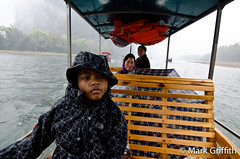 The ride back down the river towards XingPing and then to 9 Horse Mountain was a bit drier thanks to our umbrellas. Miles though was cold and done with riding on the river and started crying and complaining. So we rode until we could see the mountain in the mist and then turned back to XingPing. The bus ride back to Yangshuo was crowded. They are privately operated and the more people they can cram on, even without seats the more money they make. We said goodbye to a Miki and tromped back to our hotel cold and tired.
The ride back down the river towards XingPing and then to 9 Horse Mountain was a bit drier thanks to our umbrellas. Miles though was cold and done with riding on the river and started crying and complaining. So we rode until we could see the mountain in the mist and then turned back to XingPing. The bus ride back to Yangshuo was crowded. They are privately operated and the more people they can cram on, even without seats the more money they make. We said goodbye to a Miki and tromped back to our hotel cold and tired.
We packed our bags and prepared to return home. We’d had a wet time in beautiful green Guilin and Yangshuo. We’d seen the more adventurous side of things thanks to local guides. Sadly Stac had a pretty awful time due to her arm. But we’ll be back to explore more of this beautiful countryside.

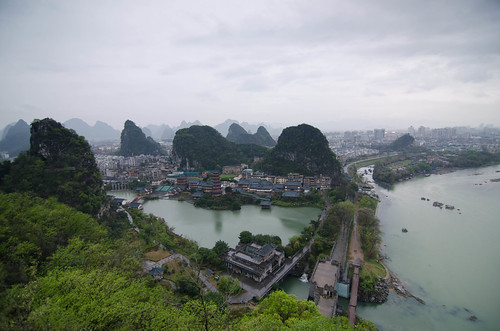
Great write up Mark. Even though the photo’s are beautiful they still don’t do the actual scenery justice. It might not have been the ideal trip for me but I am happy you had a good time. The ER doc needs a lesson in bedside manners though!